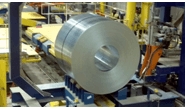Government/Policy

May 16, 2018
DOC Upholds Duties on CORE Products from Vietnam
Written by Tim Triplett
In its final determination in the Vietnam CORE anti-circumvention case, the Commerce Department ruled Thursday that imports of corrosion-resistant galvanized steel from Vietnam will still be subject to substantial antidumping and countervailing duties unless the importer can prove the substrate used in the production process was not sourced from China.
“Commerce may face challenges to this determination because of a recent Court of Appeals decision, but for now, corrosion resistant steel from Vietnam will continue to be treated as though it came from China, provided the importer did not certify that Chinese substrate was not used,” said Washington trade attorney Lewis Leibowitz.
Commerce upheld its preliminary finding of December 2017 in which it determined that CORE products produced in Vietnam using Chinese hot roll or cold roll, then exported to the United States, are of the same class or kind as other merchandise subject to the CORE orders on China. Vietnamese exporters had argued that the process of galvanizing the Chinese substrate amounted to a substantial transformation of the product, thus changing its country of origin to Vietnam.
The DOC’s preliminary ruling placed duties in excess of 200 percent on galvanized sheet from Vietnam, which will now be retroactively applied to imports dating back to November 2016.







